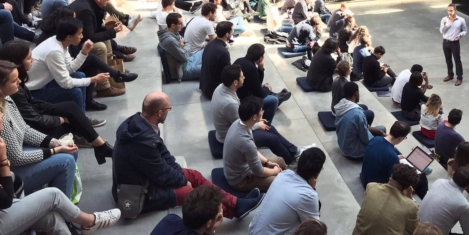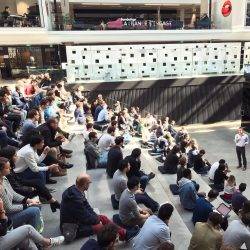October 25, 2018
Female graduates have lower salary expectations than male counterparts

Impostor syndrome is holding female graduates back from earning as much as their male counterparts as new research from Milkround claims that women have lower salary expectations than men, with one third thinking they’ll earn under £20k. Despite a third of graduate’s belief that confidence is the top skill they need to excel in their career, a lack of confidence is holding back more women (41 percent) than men (28 percent). One in three (33 percent) women are worried about low pay and think they’ll earn under £20k in an entry level role, compared to less than a quarter (22 percent) of their male counterparts. (more…)









 Two-fifths of job-seekers are being hired into new roles only to discover they have the wrong soft skills for the job. This means over half are leaving companies because their personality or work style didn’t fit, claims news research published by HireVue. The 53 percent of those who had left for this reason saying the format of the hiring process had prevented them from discovering the mismatch earlier. While four-fifths (82 percent) of candidates are confident in their ability to articulate their soft skills and personality traits in an interview, many doubt that pre-hire assessments can showcase these important attributes.
Two-fifths of job-seekers are being hired into new roles only to discover they have the wrong soft skills for the job. This means over half are leaving companies because their personality or work style didn’t fit, claims news research published by HireVue. The 53 percent of those who had left for this reason saying the format of the hiring process had prevented them from discovering the mismatch earlier. While four-fifths (82 percent) of candidates are confident in their ability to articulate their soft skills and personality traits in an interview, many doubt that pre-hire assessments can showcase these important attributes. 
 Over seven in ten UK employees want their employers to do more to motivate them claims a new study from Reward Gateway which suggests that some of the alarming effects that being unmotivated has on employees included a worsening in mood (60 percent); reduction in productivity levels (48 percent); declining mental health (46 percent) and a reduction in quality of work (40 percent). Over a quarter (26 percent) say their relationships with family and friends suffer and 2 in 10 admit to drinking more alcohol when lacking motivation.
Over seven in ten UK employees want their employers to do more to motivate them claims a new study from Reward Gateway which suggests that some of the alarming effects that being unmotivated has on employees included a worsening in mood (60 percent); reduction in productivity levels (48 percent); declining mental health (46 percent) and a reduction in quality of work (40 percent). Over a quarter (26 percent) say their relationships with family and friends suffer and 2 in 10 admit to drinking more alcohol when lacking motivation.


 The new northern home of the BBC is giving London a run for its money when it comes to siting offices for the UK’s top tech talent, with Manchester leading the way, according to
The new northern home of the BBC is giving London a run for its money when it comes to siting offices for the UK’s top tech talent, with Manchester leading the way, according to 




 The majority of employees (77 percent) agree that people should take proactive steps to manage their mental health a new survey has revealed. Of those surveyed, the vast majority felt that there is increased awareness about mental health (87 percent) and that people are more willing to talk openly about mental health issues than they were a few years ago (82 percent). The impact of high-profile people speaking out about their own mental health challenges was believed to be the biggest influencing factor, cited by more than half (53 percent) of respondents.
The majority of employees (77 percent) agree that people should take proactive steps to manage their mental health a new survey has revealed. Of those surveyed, the vast majority felt that there is increased awareness about mental health (87 percent) and that people are more willing to talk openly about mental health issues than they were a few years ago (82 percent). The impact of high-profile people speaking out about their own mental health challenges was believed to be the biggest influencing factor, cited by more than half (53 percent) of respondents. 












October 5, 2018
Developing a resilient mindset to cope with stress
by Portia Hickey • Comment, Wellbeing
(more…)